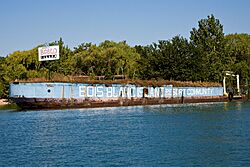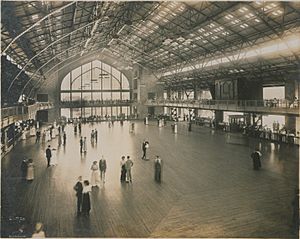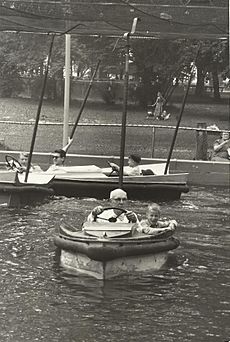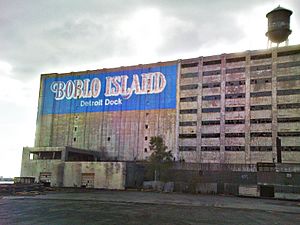Boblo Island Amusement Park facts for kids

Former main dock to Boblo Island
|
|
| Coordinates | 42°05′38.19″N 83°07′2.94″W / 42.0939417°N 83.1174833°W |
|---|---|
| Opened | 1898 |
| Closed | September 30, 1993 |
Boblo Island Amusement Park was a popular amusement park that is no longer open. It welcomed visitors from 1898 until it closed its gates on September 30, 1993. All of its fun rides were sold off in 1994.
The park was located on Bois Blanc Island in Ontario, Canada. This island is just above where the Detroit River flows into a larger body of water. Many people from Detroit, Michigan thought of it as their very own "Coney Island," a famous amusement area.
Contents
Fun Rides and Attractions
Boblo Island had many exciting attractions for everyone. Some of the most famous rides included The Nightmare, Falling Star, Wild Mouse, Sky Streak, and Screamer. There was also a classic Ferris wheel, a small zoo, and a colorful carousel.
To help visitors get around the island, the park even built a small railroad. This made it easy to reach all the different attractions.
The Grand Dance Hall
A very special building at Boblo Island was its huge dance hall. It was so big it could hold 5,000 dancers at once! This made it the second largest dance hall in the world.
The famous businessman Henry Ford helped pay for this building. It was designed by John Scott, a well-known architect from Detroit. Inside, the dance hall had a giant self-playing musical instrument called an orchestrion. This amazing machine was 16 feet tall and 14 feet wide, with 419 pipes and its own percussion section.
Scootaboats and Captain Boblo
Another popular ride was the Scootaboats. These were a lot like bumper cars, but they floated on water! Unlike modern bumper boats, Boblo's Scootaboats got their power from an electric grid above them.
From 1952, a special person named Joe Short entertained guests as 'Captain Boblo'. He was a small man who wore colorful clothes and a big hat. He would travel on the boats, telling adventurous stories and jokes to children. Before working at Boblo, he was with the Ringling Brothers Circus. Captain Boblo retired in 1974 when he was 90 years old.
The Bob-Lo Boats
Boblo Island is quite close to the town of Amherstburg, Ontario, just a five-minute ferry ride away. It's also about 18 miles from Detroit. For over 85 years, the park was famous for its two large excursion boats: the Steamer Ste Claire and the Steamer Columbia. Each of these boats could carry about 2,500 passengers!
These "Bob-Lo boats" were a big part of the park's history. They were sold in November 1991. Smaller ferries also brought visitors from Amherstburg and Gibraltar, Michigan, which are closer to the island on the Detroit River.
The Steamer Ste. Claire Fire
Sadly, the SS Ste. Claire caught fire on July 6, 2018, while it was docked in the Detroit River. The fire was an accident and caused a lot of damage. It destroyed the beautiful wooden parts and the upper decks of the historic boat.
Even though the boat was 110 years old, it was built very strongly and survived the fire. At the time, its owners were working to restore it. They said it was a steel skeleton ready to be rebuilt. However, not much progress had been made two years later.
A Fair Ride for Everyone
In 1948, a very important legal case about fairness happened involving the Bob-Lo boat service. The State of Michigan took the company to court because of racial discrimination.
In June 1945, a young woman named Sarah Elizabeth Ray and 12 other women were on a trip to Boblo Island. Sarah Ray was asked to leave the boat because she was not white. The Bob-Lo company had a rule that said they could remove people they considered "rowdy" or "rough," and this rule was also used to exclude Black people.
The Michigan Supreme Court decided that the company was wrong and fined them $25. The company then argued that they could make their own rules because they were a private business operating in another country (Canada). They said that Michigan or any other state couldn't tell them what to do about travel to another country.
However, the U.S. Supreme Court disagreed. They said that Michigan's anti-discrimination laws were valid and that the company could not discriminate against people. This was an important decision that helped make sure everyone had fair access to public services.




